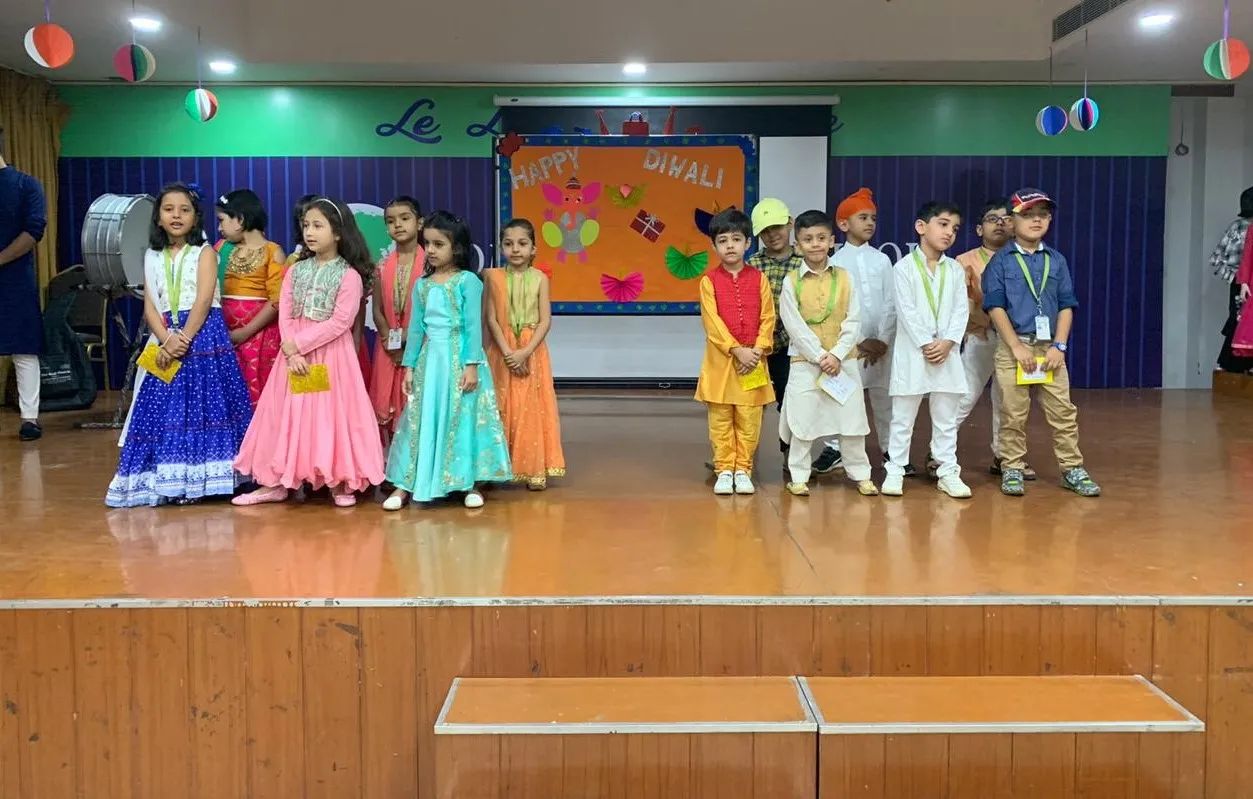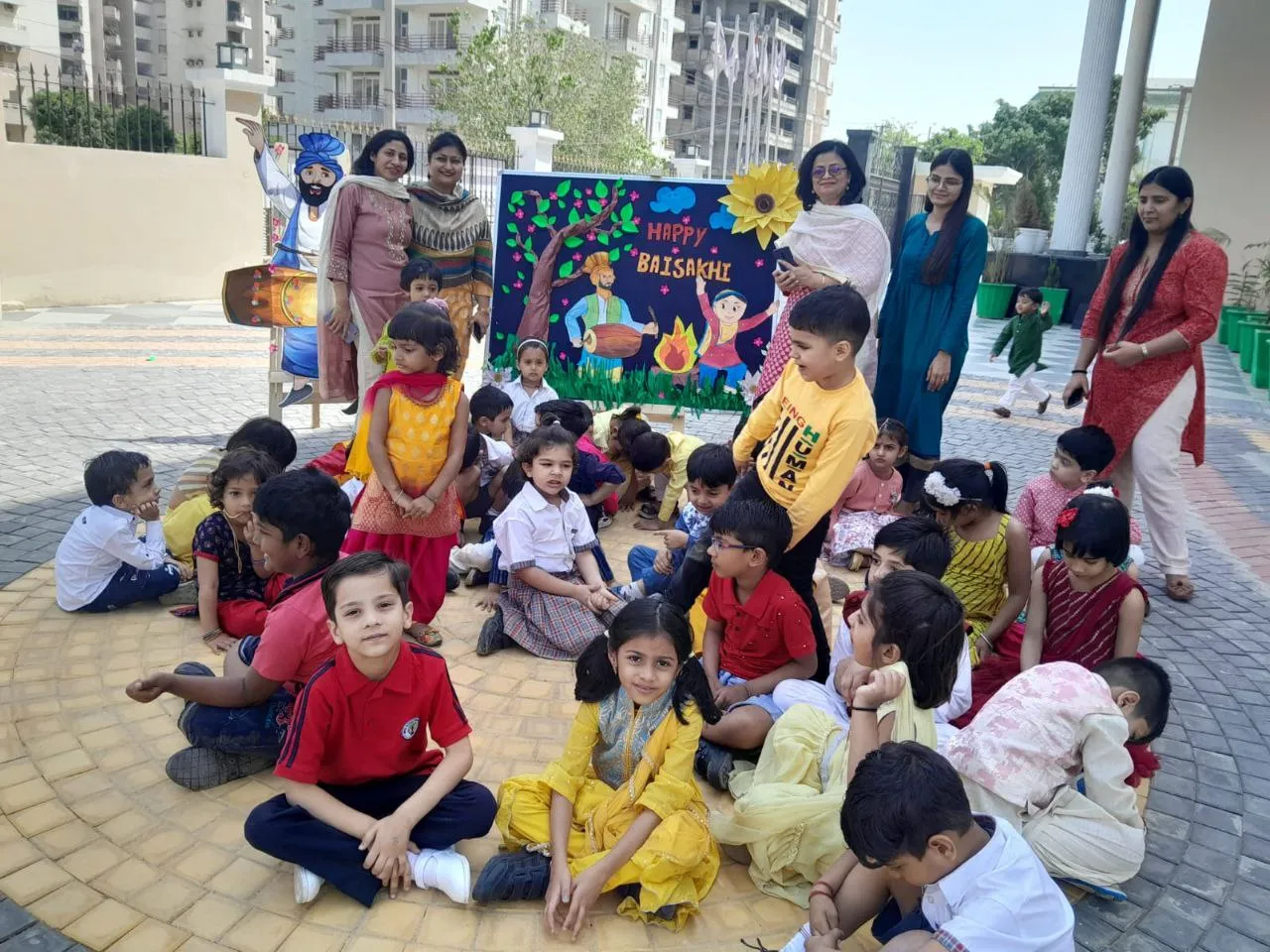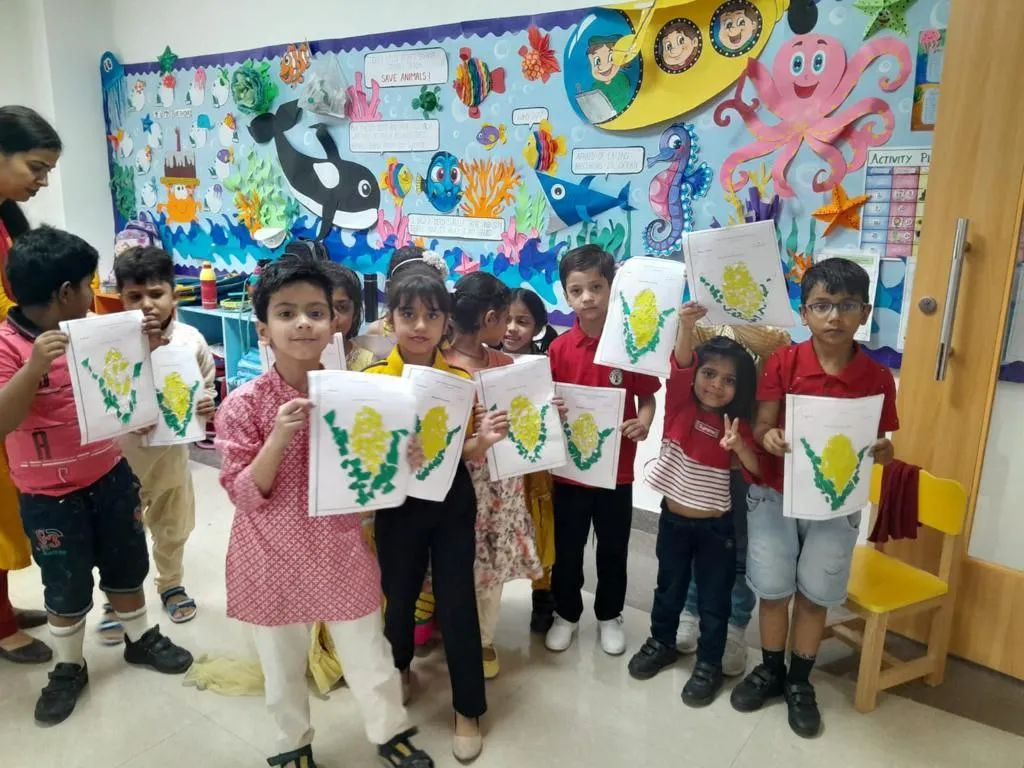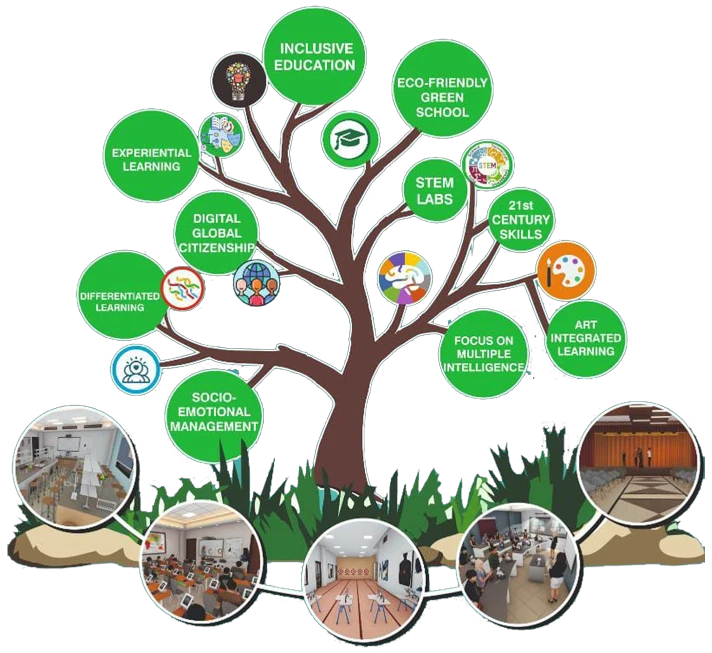The National Education Policy (NEP) 2020: Transforming Education at Ompee International School
Our Esteemed Principal Ms. Jyoti Saxena, is an experienced leader in the field of education. NEP 2020, the sole aim is to ensure quality schooling i.e. universal access for all levels from pre-primary school to Grade 12, with a new Pedagogical Structure (5+3+3+4).
- Stresses the 5 pillars: Access, Equity, Quality, Affordability, and Accountability.
- Equitable and Inclusive Education.
- Framework for transformational reforms.
- Targets a 100% Gross Enrolment Ratio (GER) in the coming decade.
- Aiming at minimizing the dropout rate.
Education plays a pivotal role in shaping the future of our society, and it is crucial to embrace progressive reforms to meet the evolving needs of learners. The National Education Policy (NEP) 2020 is a landmark initiative by the Indian government, aimed at transforming the education landscape. At Ompee International School, we wholeheartedly embrace the NEP 2020 and its vision of fostering holistic development, critical thinking, and global citizenship. In this blog, we will explore the key highlights of NEP 2020 and how it aligns with our commitment to providing quality education.
Holistic Development:
Flexible and Multidisciplinary Learning:
Technology Integration:
Highlights of National Education Policy (NEP 2020) for school education
The National Education Policy 2020 (NEP 2020) introduces several significant changes and highlights for school education in India. Some of the key highlights of NEP 2020 are:
Universalization of Early Childhood Care and Education (ECCE): The policy aims to provide every child between the ages of 3 and 6 with access to free and quality early childhood education.
Foundational Literacy and Numeracy: NEP 2020 emphasizes the importance of foundational literacy and numeracy and aims to ensure that every child achieves basic reading and mathematical skills by Grade 3.
5+3+3+4 Curricular Structure: The policy proposes a new curricular structure, where the 10+2 system is replaced with a 5+3+3+4 model. The foundational stage (ages 3-8) focuses on play-based and activity-based learning, followed by a preparatory stage (ages 8-11), a middle stage (ages 11-14), and a secondary stage (ages 14-18).
Multidisciplinary and Holistic Education: NEP 2020 promotes a multidisciplinary approach to education, encouraging students to choose subjects of their interest across various disciplines. It also emphasizes the holistic development of students, including physical fitness, life skills, arts, and vocational skills.
Reduction in Curriculum Content: The policy advocates for a reduction in the curriculum content to focus on essential learning and critical thinking. It encourages experiential learning, critical analysis, and problem-solving skills.
Flexible Board Examinations: NEP 2020 proposes changes in the board examination pattern to test core competencies rather than rote memorization. It aims to make board exams more flexible, with multiple opportunities for improvement and re-examination.
Technology Integration: The policy highlights the importance of integrating technology in education and emphasizes the use of digital resources, online learning platforms, and educational technology tools to enhance teaching and learning processes.
Teacher Training and Professional Development: NEP 2020 focuses on the continuous professional development of teachers and provides opportunities for their training, upskilling, and mentoring to improve the quality of education.
These are some of the key highlights of the National Education Policy 2020 for school education in India. The policy aims to transform the education system to ensure quality, inclusive, and holistic learning experiences for all students.
Here is the age-wise breakdown of the different levels of the school education system based on the new education policy in 2020
5 years of Foundational Stage:
For ages: 3 to 8
For classes: Anganwadi/pre-school, class 1, class 2
This stage will focus on teaching in play-based or activity-based methods and on the development of language skills.
3 years of Preparatory Stage:
For ages: 8 to 11
For classes: 3 to 5
The focus in the preparatory stage will remain on language development and numeracy skills. Here, the method of teaching and learning would be play and activity-based and also include classroom interactions and the element of discovery.
3 years of Middle Stage:
For ages: 11 to 14
For classes: 6 to 8
As per NEP 2020, this stage of school education will focus on critical learning objectives, which is a big shift from the rote learning methods used in our education system for years. This stage will work on experiential learning in the sciences, mathematics, arts, social sciences, and humanities.
4 years of Secondary Stage:
For ages: 14 to 18
For classes: 9 to 12
This stage will cover two phases: Classes 9 and 10, and Classes 11 and 12. Concepts will be covered in greater depth in this stage.
Transforming Exams:
The National Education Policy 2020 (NEP 2020) recognizes the need to transform the examination system in India. Here are some of the proposed changes to examinations as outlined in NEP 2020:
Shift from Rote Learning to Competency-Based Assessment: The policy aims to move away from the traditional rote learning approach and focus on assessing students’ competency and understanding of concepts. It emphasizes the importance of assessing critical thinking, creativity, problem-solving skills, and application of knowledge.
Board Examinations: NEP 2020 proposes changes in the board examination pattern to make it more comprehensive, and holistic, and promote a deeper understanding of subjects. The policy suggests reducing the emphasis on high-stakes board exams and encourages a modular approach, allowing students to take exams in different subjects at different times.
Examinations at Multiple Levels: The policy suggests conducting examinations at various levels to provide flexibility and multiple exit points. This allows students to progress at their own pace and choose different pathways based on their interests and aptitudes.
Reducing Exam Stress: NEP 2020 aims to reduce examination-related stress on students. It suggests implementing measures such as regular formative assessments, providing feedback on student’s progress, and involving students in self-assessment and peer assessment processes.
Assessment Reforms: The policy recommends reforms in assessment methods, including a shift towards formative assessments that focus on continuous evaluation of student learning. It suggests incorporating various assessment tools such as portfolios, projects, presentations, and practical demonstrations to evaluate students’ understanding and skills.
Technology-Enabled Assessment: NEP 2020 emphasizes the use of technology in assessments. It suggests leveraging online platforms, digital tools, and artificial intelligence to develop innovative and interactive assessment methods that can provide personalized feedback and adaptive learning experiences.
Teacher’s Role in Assessment: The policy recognizes the crucial role of teachers in the assessment process. It highlights the importance of teacher training and professional development to equip them with the necessary skills to implement effective and fair assessments.
These proposed changes in the examination system aim to foster a more holistic and comprehensive assessment of students’ abilities and promote a deeper understanding of concepts, critical thinking, and problem-solving skills rather than relying solely on memorization. The goal is to create a system that encourages learning, creativity, and a deeper engagement with the subjects being studied.
Emphasis on Teacher Training:
Global Citizenship:
NEP 2020 encourages students to develop a global outlook and become responsible global citizens. At Ompee International School, we embrace this principle by promoting cultural exchange programs, international collaborations, and global awareness initiatives. We strive to create an inclusive environment that celebrates diversity and fosters understanding, empathy, and respect for different cultures and perspectives.
Understanding the Need for Competency-based Education:

The National Education Policy 2020 has set the stage for a transformative education system in India. At Ompee International School, we are committed to implementing the NEP’s principles and providing a holistic, innovative, and inclusive learning experience to our students. Through our aligned curriculum, dedicated teachers, and focus on holistic development, we strive to empower our students to become lifelong learners, critical thinkers, and compassionate global citizens.
Join us at Ompee International School as we embark on this exciting journey of educational transformation guided by the NEP 2020, and witness the remarkable growth and success of your child.
Together, let us shape a brighter future through education.
F&Qs
The National Education Policy (NEP) 2020 in India brings forth several potential advantages and positive outcomes for the education system. Here are some of the key advantages highlighted by proponents of the policy:
Holistic Development: NEP 2020 emphasizes the holistic development of students, encompassing cognitive, social, emotional, and physical aspects. It encourages schools to go beyond traditional academic subjects and focus on the overall well-being of learners, fostering creativity, critical thinking, and social skills.
Flexibility and Choice: The policy promotes flexibility and choice in education by allowing students to select subjects based on their interests, aptitudes, and career aspirations. It encourages a multidisciplinary approach, enabling students to explore diverse fields and develop a broader skill set.
Skill Development: NEP 2020 prioritizes the development of essential skills such as critical thinking, problem-solving, communication, and collaboration. It aims to equip students with 21st-century skills required for the modern workforce, fostering innovation and entrepreneurship.
Integration of Technology: The policy recognizes the transformative role of technology in education and emphasizes its integration into teaching and learning processes. NEP 2020 encourages the use of digital resources, online learning platforms, and educational technology tools to enhance access, engagement, and personalized learning experiences.
Teacher Empowerment: NEP 2020 focuses on improving the quality of teaching by promoting teacher training, and professional development, and creating opportunities for continuous learning. The policy aims to empower teachers with innovative teaching methods, pedagogical techniques, and digital literacy to effectively engage and inspire students.
Inclusion and Equity: The policy emphasizes inclusive education, ensuring equal opportunities for all students, irrespective of their background, gender, or socio-economic status. NEP 2020 strives to bridge existing disparities in access to education and reduce dropout rates, promoting inclusivity and social justice.
Research and Innovation: The policy emphasizes the importance of research and innovation in education. It encourages collaboration between educational institutions, industry, and research organizations to drive innovation, generate new knowledge, and enhance the overall quality of education.
These advantages, if effectively implemented, have the potential to transform the education system, fostering a generation of well-rounded individuals equipped with the necessary skills and competencies to thrive in a rapidly changing world.
While the National Education Policy (NEP) 2020 in India has received widespread recognition for its progressive and transformative vision, there are also some potential disadvantages that critics have pointed out. It’s important to note that these disadvantages are based on various perspectives and interpretations. Here are a few common concerns raised:
Implementation Challenges: One of the main criticisms of NEP 2020 is the potential difficulty in implementing the proposed reforms effectively and efficiently. Implementing such sweeping changes across the entire education system requires careful planning, adequate resources, and strong administrative support. Without proper execution, the desired outcomes may not be achieved.
Standardization vs. Diversity: Some argue that NEP 2020’s focus on standardization and a common curriculum across the country could undermine regional and cultural diversity. The policy aims to provide a level playing field for students but may overlook the uniqueness and context-specific needs of different regions and communities.
Privatization and Commercialization: Critics express concerns that NEP 2020’s emphasis on public-private partnerships and the encouragement of philanthropic initiatives may lead to increased privatization and commercialization of education. There are apprehensions about equity and affordability, as well as potential discrepancies in quality and access between public and private institutions.
Assessment and Examination System: The NEP 2020 proposes a shift towards a competency-based assessment system, reducing reliance on rote memorization and high-stakes examinations. However, there are concerns about the feasibility and fairness of implementing such an assessment system on a large scale. Critics argue that alternative assessment methods may be subjective, difficult to standardize, and may not adequately measure students’ knowledge and skills.
Teacher Training and Capacity: The NEP 2020 highlights the importance of teacher training and professional development. However, some skeptics question the feasibility of adequately training a large number of teachers to meet the policy’s objectives. They express concerns about the capacity of existing teacher training institutions and the need for significant investment and resources.
It is essential to note that these disadvantages are subject to debate, and the success of NEP 2020 depends on effective implementation, stakeholder involvement, and ongoing evaluation and improvement. The long-term impact of the policy will become clearer as it unfolds and matures in the coming years.
The National Education Policy 2020 (NEP 2020) is a comprehensive framework for the development of education in India. It was introduced by the Ministry of Education (formerly the Ministry of Human Resource Development) of the Government of India and was approved by the Union Cabinet on July 29, 2020.
The NEP 2020 aims to bring about significant reforms in the education system of India by addressing various aspects, including curriculum and pedagogy, teacher training, assessment methods, and the use of technology. The policy seeks to promote holistic development, critical thinking, and a multidisciplinary approach to learning.
Ompee International School is an educational institution that operates within the framework of the National Education Policy 2020. As per the policy, Ompee International School would align its curriculum, pedagogy, and other educational practices to the guidelines and principles outlined in NEP 2020. This might include incorporating a flexible and multidisciplinary curriculum, promoting experiential learning, encouraging critical thinking and creativity, and integrating technology into the teaching-learning process.
Ompee International School, like other schools in India, would also need to adapt its infrastructure, teacher training programs, and assessment methods to meet the requirements of NEP 2020. The policy envisions a learner-centric and inclusive education system that caters to the individual needs and interests of students while ensuring their holistic development. Ompee International School would work towards implementing these objectives and contributing to the broader goals of the National Education Policy 2020.
In the context of the National Education Policy 2020 (NEP 2020), 10+2 and 5+3+3+4 refer to different curricular structures.
The 10+2 structure represents the current schooling system in India, where education is divided into ten years of primary and secondary education (from Grade 1 to Grade 10) followed by two years of higher secondary education (Grade 11 and Grade 12).
The 5+3+3+4 structure proposed by NEP 2020 signifies a new curricular framework. It includes five years of foundational stage (ages 3-8), three years of preparatory stage (ages 8-11), three years of middle stage (ages 11-14), and four years of secondary stage (ages 14-18). This new structure aims to provide a more holistic and developmentally appropriate education to students at different stages of their growth and development.
Academic Excellence: Nurturing Knowledge and Inspiring Growth
At Ompee International School, we place great emphasis on academic excellence, offering a comprehensive and well-rounded educational program that prepares our students for success.
Our commitment to providing a stimulating learning environment, innovative teaching methods, and a diverse curriculum sets us apart as a premier educational institution.


Holistic Curriculum: Igniting Minds and Fostering Critical Thinking
Our holistic curriculum is designed to ignite minds and foster critical thinking skills. We follow the CBSE (Central Board of Secondary Education) curriculum, providing a strong foundation in
core subjects such as mathematics, science, languages, and social sciences. We also integrate technology into our teaching methods, equipping students with the digital literacy skills necessary
for the 21st century.
Qualified and Dedicated Faculty: Guiding and Inspiring Excellence
Our team of highly qualified and experienced educators is dedicated to guiding and inspiring our students to achieve academic excellence. They create a nurturing and inclusive environment,
promoting active participation and personalized learning. Our teachers employ innovative teaching methodologies, engaging students in interactive discussions, hands-on experiments, and
collaborative projects.


Individualized Attention: Unlocking Potential and Encouraging Growth
We recognize that each student has unique strengths, interests, and learning styles. To ensure their holistic development, we provide individualized attention and support. Our small class
sizes enable teachers to focus on each student’s needs, identify their potential, and tailor instruction accordingly. We believe in fostering a growth mindset, empowering students to overcome
challenges and reach their full potential.
Enrichment Programs: Broadening Horizons and Cultivating Skills
Beyond the core curriculum, we offer a wide range of enrichment programs to broaden horizons and cultivate essential skills. Our co-curricular activities include art, music, dance, drama, sports, and clubs.
These programs nurture creativity, foster teamwork, develop leadership skills, and promote physical fitness, allowing students to explore their passions and develop a well-rounded personality.


Assessment and Evaluation: Encouraging Progress and Continuous Improvement
We believe in a comprehensive assessment and evaluation system that encourages progress and continuous improvement. Regular assessments, both formative and summative, provide valuable
feedback on students’ academic growth. Our teachers closely monitor progress, identify areas for improvement, and provide timely guidance and support to ensure that every student reaches their academic goals.
Parent-Teacher Collaboration: Building Strong Partnerships for Success
We value the partnership between parents and teachers in the educational journey of our students. Through open communication, regular parent-teacher meetings, and progress reports, we keep parents informed
about their child’s academic progress, strengths, and areas for improvement. We encourage parents to actively participate in their child’s education, fostering a supportive and collaborative learning environment.

At Ompee International School, academic excellence is at the core of our educational philosophy. With a holistic curriculum, dedicated faculty, individualized attention, enrichment programs, and strong parent-teacher collaboration, we strive to nurture knowledge, inspire growth, and empower our students to become confident, lifelong learners who excel academically and thrive in a rapidly changing world.

